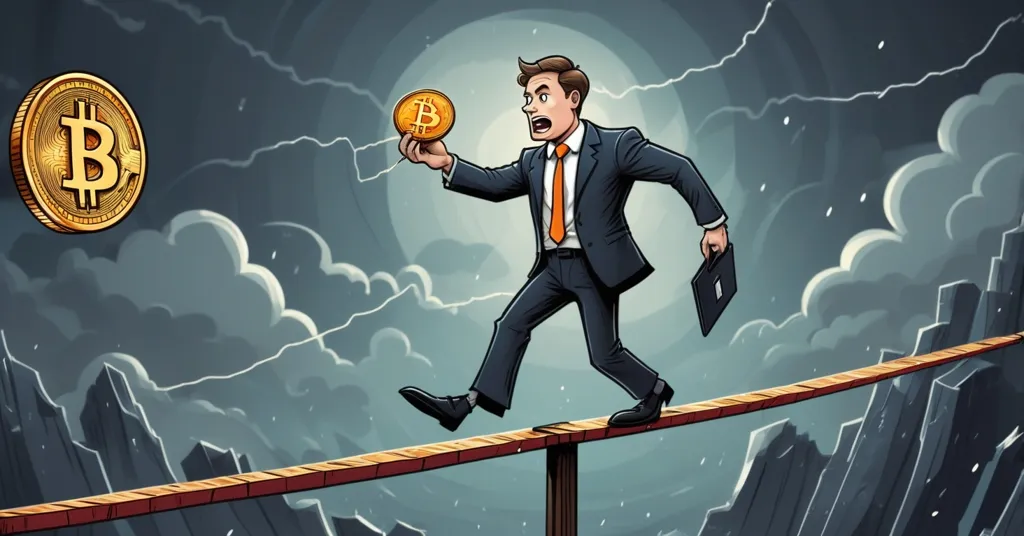Trump Jr. Invests $4M in Struggling Thumzup Media with Bitcoin Reserves: Vision or Risk?

Trump Jr. Stakes Millions in Struggling Social Media Startup with Bitcoin Reserves: Bold Vision or Reckless Bet?
Donald Trump Jr. has made waves in the crypto sphere by acquiring a significant stake in Thumzup Media Corp., a Los Angeles-based social media startup that’s burning through cash at an alarming rate while building a Bitcoin reserve. With a $4 million investment tied to the Trump family’s broader embrace of cryptocurrency, this move sparks both curiosity and concern among Bitcoin advocates and skeptics wondering if it’s a visionary leap or a dangerous gamble.
- Trump Jr.’s Investment: Purchased 350,000 shares in Thumzup, valued at over $4 million.
- Thumzup’s Financial Woes: Reported a $2.2 million loss on just $151 in revenue last quarter.
- Bitcoin Strategy: Holds over $2 million in Bitcoin and plans to diversify into six more cryptocurrencies.
Thumzup’s Financial Abyss and Bitcoin Gamble
Let’s get straight to the point: Thumzup Media Corp. is far from a tech success story. This niche startup runs a platform that pays everyday users—often young social media enthusiasts—to promote brands on Instagram. It’s a micro-influencer concept where someone might pocket a few bucks for posting about a local diner or a trendy gadget. On paper, it’s a clever slice of the gig economy, tapping into the power of grassroots marketing. But the reality is stark. Last quarter, Thumzup posted a staggering $2.2 million loss against a pitiful $151 in revenue. That’s the kind of financial hole that would make even the most optimistic VC wince. Competing with behemoths like TikTok and Instagram for user attention, Thumzup struggles to scale without the marketing budget or user base to stand out.
Yet, in the midst of this financial chaos, Thumzup has taken a curious turn since January by funneling its liquid assets into Bitcoin, amassing over $2 million in BTC as a corporate treasury reserve. For those new to the concept, this means a company converts a chunk of its cash into cryptocurrency, betting on its value as a hedge against inflation or fiat currency devaluation—imagine swapping dollars for digital gold in hopes it appreciates over time. Companies like MicroStrategy have famously adopted this strategy, holding billions in Bitcoin and often reaping rewards during bull markets. But for a startup like Thumzup, teetering on the brink of insolvency, this is a high-stakes play, as detailed in their financial statements. A sharp drop in Bitcoin’s price—say, a 30% crash, which isn’t uncommon in this volatile market—could wipe out their already fragile financial cushion. Now, with plans to diversify into six additional cryptocurrencies, the risk only multiplies. Are they eyeing Ethereum for its smart contract capabilities or stablecoins like USDT for reduced volatility? We don’t know yet, but each new coin adds another layer of uncertainty to an already shaky foundation.
The market’s reaction reflects this ambivalence. Thumzup’s stock soared nearly 75% over four sessions following the investment news, only to drop 17% mid-Wednesday once deeper filings emerged. That kind of whipsaw action is enough to give even seasoned crypto traders vertigo. So, is this Bitcoin pivot a forward-thinking move to draw in crypto-savvy investors, or a flashy distraction from a core business that’s failing to deliver? While holding BTC could position Thumzup as a cutting-edge tech firm in the eyes of some, as explored in this company update, it doesn’t erase the glaring issue: without a viable revenue stream, no amount of digital gold can keep the lights on forever.
Trump Family’s Crypto Empire: Strategy or Speculation?
Trump Jr.’s involvement in Thumzup isn’t a standalone stunt; it’s a piece of a much larger puzzle in the Trump family’s aggressive push into cryptocurrency. His $4 million stake, based on a previous closing price of $12.36 per share for 350,000 shares, aligns with a pattern of high-profile crypto bets across various Trump-linked ventures, as reported in this recent coverage. Take Trump Media & Technology Group, for instance, which has deployed a whopping $2.3 billion into Bitcoin reserves. Then there’s the family’s advisory roles at firms like Metaplanet and Dominari Securities—the latter arranged Thumzup’s recent $6 million private placement of convertible preferred stock. Donald Trump himself, once a vocal critic who dismissed Bitcoin as a “scam” in 2021, now champions the US as the “crypto capital of the world.” His personal crypto ventures, spanning meme coins like $TRUMP and $MELANIA, NFT deals, and the stablecoin-focused World Liberty Financial, have reportedly netted nearly $1 billion in revenue.
Digging deeper, the specifics are eyebrow-raising. The $TRUMP meme coin—a cryptocurrency often tied to internet trends or jokes and notorious for wild speculation—alone generated $300 million, with reports suggesting 80% of tokens are held by Trump affiliates. For the uninitiated, meme coins are digital assets that often lack fundamental utility, riding on hype rather than tech innovation. Similarly, World Liberty Financial, with plans for stablecoins (digital currencies pegged to assets like the US dollar to minimize price swings), has raised $550 million, including a $25 million investment from UAE-based DWF Labs and deals involving entities in Pakistan. That’s not just a financial strategy; it’s a sprawling empire that blends crypto speculation with geopolitical undertones, sparking heated community discussions.
Ethical Quagmire: When Politics Collides with Decentralization
Here’s where the story takes a darker turn. The Trump family’s crypto ventures are steeped in controversy, and for good reason. Potential conflicts of interest loom large when political heavyweights are tied to speculative markets. Reports of private dinners with $TRUMP token holders and foreign buyers from regions like the UAE paint a troubling picture of possible access-selling—where financial stakes might double as political leverage. World Liberty Financial’s international dealings, including ties to Binance (an exchange with its own history of regulatory scrutiny), only amplify concerns about global compliance and transparency. Add to that the optics of a former president’s family pushing crypto while potentially influencing US regulatory frameworks, and you’ve got a mess stickier than a hacked exchange’s order book, as debated in this ethical analysis.
For Bitcoin purists, this is a gut punch. The beauty of BTC lies in its apolitical nature—a decentralized currency free from the whims of governments or corporate overlords. Yet, when high-profile figures like the Trumps entangle crypto with political clout, it threatens to undermine that ethos, a concern highlighted in discussions about political impacts. Even worse, ventures like meme coins and NFT hustles often smell of exploitation. With 80% of $TRUMP tokens allegedly held by insiders, we’re not talking about decentralization; we’re talking about a glorified pump scheme dressed up as innovation. We’re all for disrupting the status quo, but not when it turns crypto into a playground for the powerful to fleece retail investors.
Let’s play devil’s advocate for a moment. Some in the crypto community might argue that any high-profile endorsement—Trump or otherwise—brings much-needed attention to Bitcoin. If Donald Trump’s push for the US to dominate as a crypto hub sparks legislative momentum, it could dismantle regulatory roadblocks that have stifled innovation for years. But at what cost? Democratic pushback on stablecoin laws and whispers of foreign influence in Trump-linked projects suggest the road to progress is fraught with potholes. If Trump ventures get a regulatory free pass while others face scrutiny, we’re not building a freer financial system; we’re just picking new gatekeepers.
Lessons for Bitcoin’s Future: Adoption or Exploitation?
Zooming out, Thumzup’s Bitcoin gamble—backed by Trump Jr.’s millions—serves as a microcosm of the broader crypto landscape. It embodies the thrilling potential of decentralized finance while exposing the ugly underbelly of speculation and ethical pitfalls. Compare Thumzup to MicroStrategy, which turned BTC reserves into a balance sheet triumph during bull runs, or to lesser-known firms that collapsed in the 2022 bear market after over-leveraging on crypto. The difference often boils down to fundamentals: a profitable core business can weather Bitcoin’s volatility; a struggling startup like Thumzup might not survive the next dip, as analyzed in this financial breakdown. Their plan to add six more cryptocurrencies only heightens the stakes, as each new asset introduces fresh risks without addressing the root issue of negligible revenue.
This saga underscores a critical tension in crypto’s journey toward mainstream acceptance. Bitcoin and blockchain tech hold the promise of reshaping finance—freeing us from centralized banking monopolies and empowering individuals with true financial sovereignty. But that vision gets muddied when speculative bubbles, political power plays, and insider schemes dominate the headlines. We’re here to champion effective accelerationism, pushing for rapid adoption of decentralized systems, but not at the expense of integrity. Thumzup might be a footnote in the grand scheme, but the actions of high-profile players like the Trump family could either build trust in Bitcoin or deepen public skepticism, a topic of active investor debate. The stakes for crypto’s rebel spirit couldn’t be higher.
Key Takeaways and Critical Questions
- What is Thumzup Media Corp., and why is it stockpiling Bitcoin despite massive losses?
Thumzup is a social media startup paying users to promote brands on Instagram, but with a $2.2 million loss against $151 in revenue, it’s floundering. Its $2 million Bitcoin reserve seems like a speculative hedge or a bid to attract investors, much like MicroStrategy, though its weak fundamentals make this a riskier bet. - How does Trump Jr.’s stake fit into the Trump family’s crypto strategy?
His $4 million investment in Thumzup mirrors a family-wide push into digital assets, from Trump Media’s $2.3 billion Bitcoin hoard to Donald Trump’s $1 billion haul via meme coins and stablecoin projects like World Liberty Financial. It’s a calculated play leveraging finance and political influence. - Why do Trump-linked crypto ventures spark so much controversy?
They’re tangled in potential conflicts of interest, with political clout, foreign investments (like UAE ties in World Liberty Financial), and insider holdings (80% of $TRUMP tokens). This risks turning crypto into a politicized tool, clashing with Bitcoin’s decentralized principles. - Could Donald Trump’s pro-crypto stance drive Bitcoin adoption forward?
His ambition to make the US a crypto hub might lead to favorable regulations, easing barriers for Bitcoin and blockchain tech. However, it could also polarize the space, favoring Trump ventures and alienating those who see BTC as apolitical. - Is Thumzup’s Bitcoin reserve strategy innovative or financial folly?
Holding BTC could hedge against fiat devaluation and signal innovation, but for a near-broke company, it’s a reckless gamble. Bitcoin’s volatility, plus diversifying into six more coins, could sink them if prices crash—core business health should come first.



